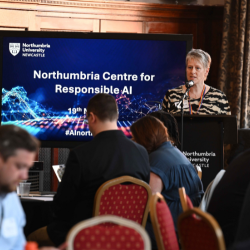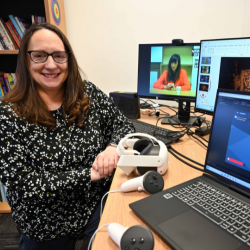
Academics at Northumbria University, Newcastle, and the University of Highlands and Islands, Scotland, are investigating Psychological First Aid training as a tool to support care workers’ wellbeing amid the Covid-19 pandemic.
There are approximately working in care homes across the UK, all of whom have faced challenging times due to the ongoing Covid-19 pandemic.
They have been at the forefront of battling Covid-19 while growing international evidence has shown that the virus disproportionally impacts people living in nursing and residential care homes, with subsequent high mortality.
In order to support the frontline staff such as care workers through these trying and uncertain times, in June last year it was announced by the Minister for Mental Health Nadine Dorries that staff and volunteers at the forefront of the national coronavirus response would be able to access a free Psychological First Aid training course.
Now, academics from Northumbria University and the University of Highlands and Islands are conducting a study to evaluate the usage and efficacy of Psychological First Aid for people working in the care home sector throughout the Covid-19 pandemic.
Funded by the Royal College of Nursing Foundation, the research will ultimately enable the team to make recommendations regarding further implementation of Psychological First Aid. It will also help them to influence policy and the development of support services for healthcare staff for any future crises.
Dr Mariyana Schoultz, the project lead and Senior Lecturer in Mental Health in Northumbria’s Department of Nursing, Midwifery and Health, said: “We feel honoured to lead on such an important project. Care home staff have had a particularly hard time during the Covid-19 pandemic. This study will enable us to see if this is a useful intervention for frontline care staff and how we can support care homes and their staff further during crises.”
What is Psychological First Aid?
First developed by the World Health Organisation, Psychological First Aid (PFA) is the globally recommended training for supporting people during emergencies and offers guidance on delivering psychosocial care in the immediate aftermath of an emergency event.
Although PFA training was originally created for people to support others, it has recently also been identified by scientists as a suitable way of helping care workers take care of their own mental health and wellbeing, therefore reducing distress caused by traumatic events such as the Covid-19 pandemic.
The key aims of Psychological First Aid are to establish feelings of safety, calmness, self and community efficacy, connectedness and hope by providing an environment that is calming, comfortable, and where people can decompress and feel heard.
As part of the new study, the research team are asking anyone who works in a care home to complete a 15-minute which will help them to identify where in the UK Psychological First Aid is being used and how it was implemented.
The researchers will then compare levels of safety, calmness, self and community efficacy, connectedness and hope, stress, resilience and coping in care home staff working in care homes that have implemented PFA against those who work in settings which have not.
Dr Michelle Beattie, Lecturer in Nursing at the University of Highlands and Islands, said: “We are delighted to be involved in this important study. We know the challenges that care staff have faced during the Covid-19 pandemic and this study contributes to establishing effective interventions to support them. The study also fits well with our wider portfolio of research into care homes.”
Focus groups with care home staff in each UK nation will also be conducted to examine in detail the experiences, benefits, drawbacks and impact of PFA training on their coping and wellbeing during the Covid-19 pandemic.
The project is entitled the EMPATH study - Evaluation and Measurement of Psychological first-Aid in The care Home sector during the Covid-19 pandemic.Anyone interested in taking part in the research can .
More detailed information for participants is available on the study’s
News
- Northumbria graduate entrepreneur takes the AI industry by storm
- Study identifies attitudes towards personal data processing for national security
- Lifetime Brands brings student design concept to life
- New study reveals Arabia鈥檚 鈥榞reen past鈥� over the last 8 million years
- How evaluation can reform health and social care services
- Researchers embark on a project to further explore the experiences of children from military families
- Northumbria University's pioneering event series returns with insights on experiential and simulated learning
- Support for doctoral students to explore the experiences of women who have been in prison
- Funding boost to transform breastfeeding education and practice
- A new brand of coffee culture takes hold in the North East
- BBRSC awards £6m of funding for North East Bioscience Doctoral Students
- £3m funding to evaluate health and social care improvements
- Balfour Beatty apprentices graduate from Northumbria University
- Long COVID research team wins global award
- Northumbria researchers lead discussions at NIHR event on multiple and complex needs
- Healthcare training facility opens to support delivery of new T-level course
- Venice Biennale Fellowship
- Young people praise Northumbria University for delivery of HAF Plus pilot
- Nursing academics co-produce new play with Alphabetti Theatre
- Research project to explore the experiences of young people from military families
- Academy of Social Sciences welcomes two Northumbria Professors to its Fellowship
- Northumbria University set to host the Royal College of Nursings International Nursing Research Conference 2024
- 2.5m Award Funds Project To Encourage More People Into Health Research Careers
- Advice available for students ahead of A-level results day
- Teaching excellence recognised with two national awards
- Northumbria law student crowned first Apprentice of the Year for the region
- Northumbria University launches summer activities to support delivery of Holiday Activities and Food programme
- UK health leader receives honorary degree from Northumbria University
- Use of AI in diabetes education achieves national recognition
- Research animation explores first-hand experiences of receiving online support for eating disorders
- Careers event supports graduate employment opportunities
- Northumbria University announces £50m space skills, research and development centre set to transform the UK space industry
- The American Academy of Nursing honours Northumbria Professor with fellowship
- New report calls for more support for schools to improve health and wellbeing in children and young people
- AI experts explore the ethical use of video technology to support patients at risk of falls
- British Council Fellows selected from Northumbria University for Venice Biennale
- Prestigious nomination for Northumbria cyber security students
- Aspiring Architect wins prestigious industry awards
- Lottery funding announced to support mental health through creative education
- Early intervention can reduce food insecurity among military veterans
- Researching ethical review to support Responsible AI in Policing
- Northumbria named Best Design School at showcase New York Show
- North East universities working together
- Polar ice sheet melting records have toppled during the past decade
- Beyond Sustainability
- Brewing success: research reveals pandemic key learnings for future growth in craft beer industry
- City's universities among UK best
- Famous faces prepare to take to the stage to bring a research-based performance to life
- Insights into British and other immigrant sailors in the US Navy
- International appointment for law academic
- Lockdown hobby inspires award-winning business launch for Northumbria student
- Lasting tribute to Newcastle鈥檚 original feminist
- Outstanding service of Northumbria Professor recognised with international award
- Northumbria academics support teenagers to take the lead in wellbeing research
- Northumbria University becomes UK's first home of world-leading spectrometer
- Northumbria's Vice-Chancellor and Chief Executive to step down
- Out of this world experience for budding space scientists
- Northumbria engineering graduate named as one of the top 50 women in the industry
- Northumbria University signs up to sustainable fashion pledge
- Northumbria demonstrates commitment to mental health by joining Mental Health Charter Programme
- Virtual reality tool that helps people to assess household carbon emissions to go on display at COP26
- EXPERT COMMENT: Why thieves using e-scooters are targeting farms to steal £3,000 quad bikes, and what farmers can do to prevent it
- Exhibition of lecturer鈥檚 woodwork will help visitors reimagine Roman life along Hadrian鈥檚 Wall
- Students reimagine food economy at international Biodesign Challenge Summit
- Northumbria storms Blackboard Catalyst Awards
- Breaking news: Northumbria鈥檚 Spring/Summer Newspaper is here!
- UK鈥檚 first ever nursing degree apprentices graduate and join the frontline
- Massive decrease in fruit and vegetable intake reported by children receiving free school meals following lockdown
- Northumbria awards honorary degrees at University鈥檚 latest congregations
This is the place to find all the latest news releases, feature articles, expert comment, and video and audio clips from Northumbria University
Latest News and Features

Northumbria retains globally-recognised built environment accreditation
Northumbria University has once again cemented its reputation as a leading institution providing…

Research programme boosts devolved cultural policy making
This week AHRC Creative Communities announced three major project outputs, with the creation…

Northumbria Professor appointed as REF sub-panel Deputy Chair
Northumbria University鈥檚 Professor Glyn Howatson will be playing a key role in the next national…

Northumbria University launches Centre for Responsible AI
Northumbria University has launched a pioneering centre of excellence in responsible AI research…

Annual showcase REVEALs next generation of creative and cultural talent
A student showcase which is one of the highlights of the North East鈥檚 cultural calendar is…

New research could enhance the future of teaching in higher education
Academics from universities across the UK are about to launch a research project which could…

Northumbria Deputy Faculty Pro Vice Chancellor made Fellow of the Royal College of Nursing
Professor John Unsworth OBE has been admitted as a Fellow of the Royal College of Nursing (FRCN)…

Universities partnership 鈥榓 blueprint鈥� for others
The Universities for North East England partnership could be a blueprint for the rest of the…
Upcoming events

REVEAL: History
Room 301 and 313, Sandyford Building
-

REVEAL: Theatre and Performance
Stage 2

Women鈥檚 Sport and Wellbeing Summit 2025
Lecture Theatre 003
-

NU Advice: Still time to apply
Virtual Event
-
